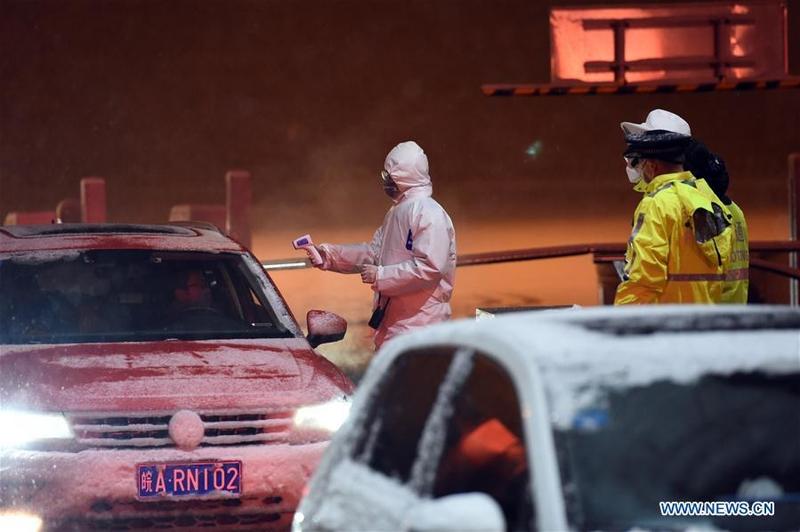 A health worker measures temperature for passengers inside a car at a toll station in Hefei, east China's Anhui province, Feb 15, 2020. (ZHOU MU / XINHUA)
A health worker measures temperature for passengers inside a car at a toll station in Hefei, east China's Anhui province, Feb 15, 2020. (ZHOU MU / XINHUA)
Increasing signs of a stable slowdown in the spread of novel coronavirus pneumonia in China appeared over the weekend, as health authorities pledged to maintain their assertive measures in Hubei province to avert the virus flaring up again at its epicenter.
Outside Hubei, the number of new infections nationwide had dropped for 12 consecutive days as of Saturday. In Hubei, new cases had declined for three days in a row, and the number of suspected cases awaiting diagnosis is also shrinking, according to figures released by the National Health Commission.
Meanwhile, the rate of severely ill patients has dropped significantly across the country, as in Wuhan, the provincial capital of Hubei, the proportion of patients in serious condition decreased to 21.6 percent on Sunday from a high of 32.4 percent on Jan 28, commission spokesman Mi Feng said on Sunday.
A substantial foundation has been laid to further increase the recovery rate and reduce the mortality rate.
Mi Feng, Spokesman for the National Health Commission, China
Across Hubei, the proportion of severe cases decreased to 11.1 percent on Saturday from the peak of 18.4 percent on Jan 27, and the percentage of severe cases across the rest of the country declined to 7.2 percent on Saturday, he said.
This was made possible by strengthened medical assistance, as well as centralized isolation and treatment, Mi said. "A substantial foundation has been laid to further increase the recovery rate and reduce the mortality rate," he added.
ALSO READ: China develops plasma therapy for coronavirus patients
However, the positive signals are not eclipsing the fact that the overall confirmed cases and fatalities nationwide are still on the rise, and some instances of infection clusters in Hubei province are particularly concerning, according to health officials.
The commission registered 2,009 new confirmed infections and 142 additional deaths on the Chinese mainland on Saturday. In all, 68,500 people on the Chinese mainland have been infected and 1,665 have died.
The majority of new infections and fatalities are still concentrated in Hubei province, where 1,843 confirmed patients and 139 new deaths were added on Saturday.
Wuhan authorities must "make sure that no city will become a second Wuhan" and ensure that "zero patients would go without treatment," Wang Hesheng, head of Hubei Provincial Health Commission, said
Wang Hesheng, head of Hubei Provincial Health Commission, said on Saturday that refined control measures have subdued the outbreak and earned precious time for the country to brace for the most strenuous stretch in the fight against the disease.
"Wuhan remains the primary battlefield," he said, adding that the authorities must "make sure that no city will become a second Wuhan" and ensure that "zero patients would go without treatment".
He spoke at a news conference held in Wuhan by the State Council Information Office.
Liang Wannian, head of the commission's institutional reform department who also leads the commission's disease control team, said on Saturday that a handful of provincial-level regions, including Shanxi, Jilin and Gansu provinces, had recorded fewer than five new cases for three consecutive days.
READ MORE: Epidemic experiences major slowdown
"In Wuhan, the rate of new infections had been slowing down since Feb 1. But for other regions in the province, including Xiaogan and Huanggang, the rate remains high, and the numbers of clustered infections in families and imported cases are relatively large," he said, adding that the risk of sustained transmission and a sudden surge in cases is considered low.
"At present, disease control work in Hubei province is at the most critical stage, and the tension is mounting," Liang said. "We must keep a firm grip on the region."
All non-essential public and group activities in Hubei will be halted, and a widespread screening that covers all residents will be launched, according to an announcement by the Hubei provincial government
On Sunday, the Hubei provincial government announced the upgrading of its containment efforts, by implementing the strictest, around-the-clock lockdown policies across all villages, communities, neighborhoods and residential areas.
All non-essential public and group activities in Hubei will be halted, and a widespread screening that covers all residents will be launched, according to a government announcement.
The announcement reiterates that infected patients and people with fever who cannot be ruled out from contracting the virus must be isolated in designated facilities.
READ MORE: China at most crucial stage of virus prevention, control
The use of all vehicles is prohibited except for public transportation and those for epidemic control purposes, such as cars carrying medical staff, delivering daily necessities, ambulances, and vehicles from the sanitation, firefighting and public security departments, it said.
In addition, there are 39,447 infected patients who need medical care in Hubei, with 8,439 of them in serious condition and 1,957 in critical condition, according to the provincial health commission.
Wang, head of the provincial health commission, said the authorities will continue to repurpose wards in some hospitals into designated centers for seriously ill patients and transform public facilities into temporary treatment centers.
As of Saturday, nine temporary hospitals with more than 6,900 beds were operational, receiving over 5,600 patients with mild symptoms, Wang said.



